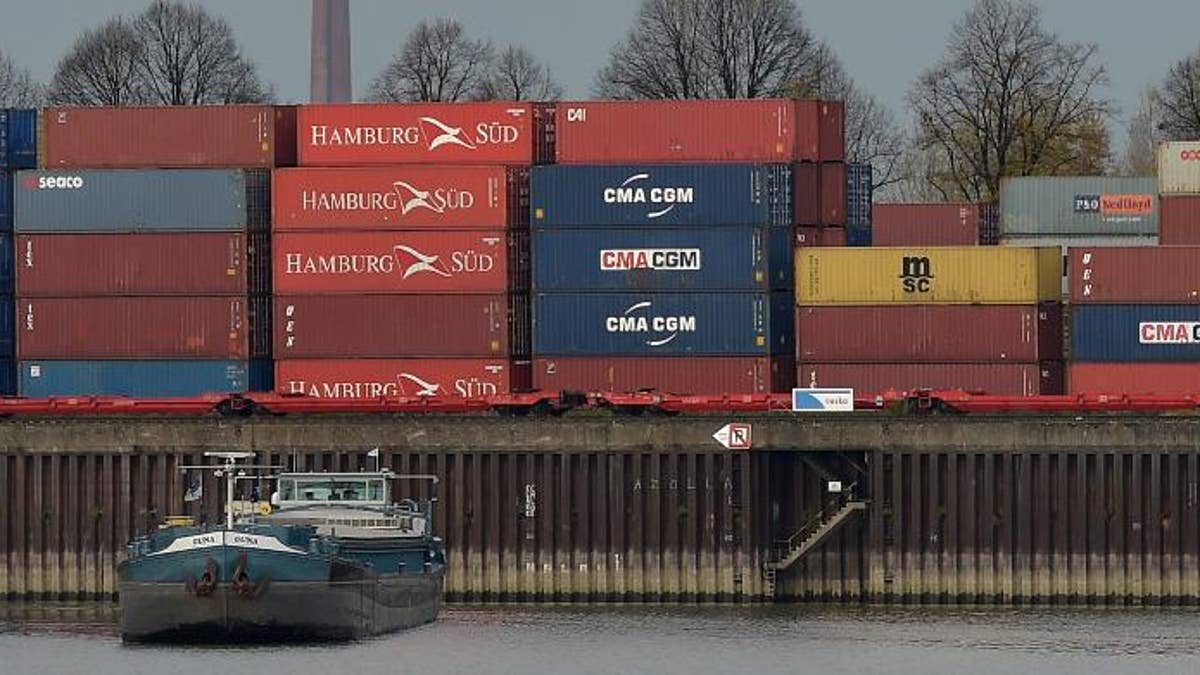
Containers wait for loading at the harbor in Cologne, Germany, Tuesday, Nov. 11, 2014. (AP Photo/Martin Meissner) (The Associated Press)
PARIS – A lot needs to go right for the eurozone economy to get going again.
A report Friday is expected to show the 18-country currency union barely grew in the third quarter — its failure to achieve lift-off in the year since emerging from its longest-ever recession has proved frustrating for Europeans and burdensome for the global economy.
With the economy stagnating, not enough jobs are being created and wages remain stagnant. Europe's troubles are casting a pall over major trading partners, particularly the U.S., China and Japan.
The eurozone's problems are no secret — companies are too worried to invest or hire, consumers are not spending and many banks are wary of lending. So why is it proving so difficult to solve them?
Here's a look at what the eurozone needs to get its economic engines purring again, and why that has not yet happened.
MORE SPENDING
Most European governments cut back drastically on spending to heal their public finances. Without a thriving private sector, that is like pulling the handbrake on the economy.
Economists say greater investment on such things as roads and schools would help now, but Germany, Europe's most powerful economy, remains adamant that a focus on keeping budgets in check has to be the number one priority.
France, for example, is cutting 50 billion euros ($62 billion) in spending to get its deficit within EU limits, even though its economy is weak.
Pierre Musseau of Paris-based think tank Terra Nova says investing in the energy sector can yield the best results as the industry is a strong job creator. He estimates that between 8 and 27 new jobs are created annually for every million euros invested in renovating buildings' energy efficiency, for example.
ECB ACTION
The European Central Bank has been praised for its efforts to support growth. It has slashed interest rates to record lows and has launched multiple programs to encourage bank lending.
And yet, its measures have been less aggressive than those of other major central banks. The U.S. Federal Reserve, Bank of Japan and Bank of England have taken the bigger step of buying government bonds in large amounts. The measure aims to help by making borrowing cheaper.
The ECB has shied away from such a program, both because Germany is against the idea and because it is technically difficult across 18 markets. But with the economy still sagging, the ECB said last week it is now considering such a move to improve the flow of credit to businesses and households.
"There has to be more lending in to the real economy," said Orlando Green, a strategist from Credit Agricole CIB. "That should create more positive sentiment."
REFORMS
Many European economies are not growing for a more fundamental reason — they are inefficient. Red tape slows business activity and discourages companies from hiring, while bloated bureaucracies sap public coffers.
Some countries, like Spain and, have made big progress in reforming their economies and are emerging from recession but others — notably Italy and France — have lagged behind.
Italian Premier Matteo Renzi in particular is struggling with huge domestic political opposition to his plans to make labor markets more flexible. Making it easier for a company to fire a worker, he argues, would encourage them also to hire more.
GLOBAL MARKET, TRADE
The eurozone is among the most connected parts of the world through trade and financial markets. That means problems elsewhere, such as the slowdowns in China and Brazil as well as sanctions against Russia have dented confidence — German manufacturers have noted an ominous drop in international orders this summer, particularly from Asia and Russia.
If the European economy were healthy, it would be able to withstand such international headwinds — but in its current state the risk is that the eurozone could sink back into recession, its third since the global financial crisis started in 2008.
The biggest immediate boost could come from the euro's exchange rate. The currency's value has fallen from $1.40 in May to $1.2450 — that makes exporters' goods more competitive in international markets, potentially leading to higher profits and hiring possibilities.
"That can help business confidence sooner than any other factors," said Jennifer McKeown, senior eurozone economist at Capital Economics.
